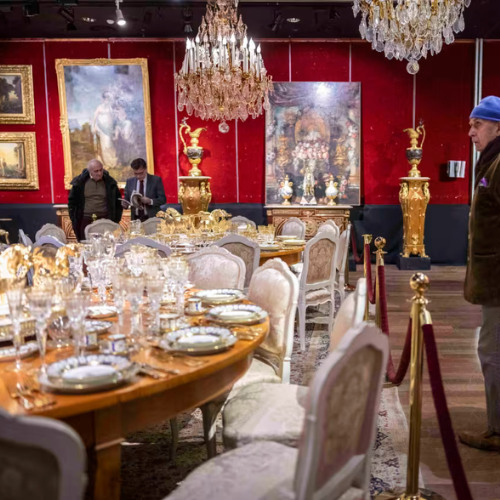For over 50 years, the Assad family ruled Syria with an iron grip, amassing a secret fortune while the country’s people endured poverty and war. The family patriarch, Hafez al-Assad, seized power in 1970 and created a system of wealth hoarding that his son, Bashar al-Assad, carried forward after taking control in 2000. Over decades, the Assads and their close relatives built a vast global empire of hidden assets, ranging from luxury real estate to high-end businesses.
Estimates suggest the family’s hidden fortune could be anywhere between $1 billion and $12 billion. This wealth came from state monopolies, corruption, and illegal activities like drug smuggling, particularly the production and sale of a drug called captagon. Meanwhile, regular Syrians suffered. By 2022, nearly 70% of the population lived in poverty, struggling to find basic necessities while the Assads and their associates flaunted wealth abroad.
Some of the family’s overseas properties have been identified, including lavish mansions in Dubai, luxury apartments in Moscow, and boutique hotels in Vienna. They even owned a private jet worth millions, customized with two living rooms and a shower. Investigators say much of this wealth was funneled out of Syria through shell companies and tax havens, making it difficult to track down and recover.
A Dynasty Torn Apart
The downfall of Bashar al-Assad on December 8 marked the end of his 24-year rule, following weeks of rapid advances by opposition forces in Syria. Assad fled to Russia, leaving behind a country in ruins and a family network strained by years of greed and mistrust.
Key to the Assads’ financial empire was Bashar’s cousin, Rami Makhlouf. Rami controlled businesses in banking, telecommunications, real estate, and media, and was once worth as much as $10 billion. He acted as a “banker” for the Assad regime, ensuring funds were available when needed. However, in 2020, Bashar turned on Rami, stripping him of power and placing him under house arrest.
US Sanctions Fawaz al-Akhras, Assad’s Father-in-law, Amid Syria Crisis
The reasons for this fallout remain unclear, but it may have been due to the public embarrassment caused by Rami’s sons. On social media, they flaunted their wealth, posing with Ferraris, sipping champagne in Dubai’s most exclusive nightclubs, and customizing private jets. While ordinary Syrians were struggling to survive a brutal civil war, such displays of extravagance created outrage.
Rami’s fall allowed Bashar’s wife, Asma al-Assad, to step in and take control of his seized assets. Asma, a former banker, has been described as one of the regime’s most ruthless operators. Western governments have accused her of being deeply involved in the regime’s corruption, calling her one of Syria’s “most notorious war profiteers.”
The Global Hunt for Hidden Wealth
The collapse of the Assad regime has triggered a worldwide search for the billions they stashed away during their rule. Lawyers, investigators, and human rights groups are combing through records, hoping to recover assets that rightfully belong to the Syrian people. However, recovering these funds is expected to be a long and challenging process.
Previous attempts to retrieve stolen fortunes from other fallen dictators, such as Iraq’s Saddam Hussein and Libya’s Moammar Gadhafi, have seen limited success. Both leaders had hidden their wealth in complex networks of shell companies and foreign investments. Out of Gadhafi’s estimated $54 billion fortune, only a small fraction was ever recovered.
Israel Targets Strategic Weapons in Syria as Putin Grants Assad Asylum
In the Assads’ case, some progress has been made. In 2019, a French court froze $95 million worth of property owned by Bashar’s uncle. Investigators believe much more remains hidden in countries like Russia and the United Arab Emirates, which are harder to access for legal teams.
The Role of Drug Money and Public Outrage
The Assad family’s wealth came not only from monopolies and embezzlement but also from the illegal captagon drug trade. Between 2020 and 2022, this smuggling operation brought in an estimated $2.4 billion annually, helping the regime survive international sanctions. Some of the drug production facilities, controlled by Bashar’s younger brother, were recently discovered and exposed by opposition forces.
Since the fall of the regime, ordinary Syrians have taken matters into their own hands. Videos have surfaced of people raiding Assad family properties, carting away luxury furniture and even sports cars. One video showed a garage filled with high-end vehicles, including a Lamborghini and Aston Martins, symbols of the lavish lifestyle the family maintained while their country crumbled.
The exact whereabouts of key family members, including Bashar’s younger brother Maher and cousin Rami, remain unknown. Investigators are piecing together their financial web, but much of the money is believed to be hidden in Dubai, Moscow, and other hard-to-reach locations.
The search for justice continues, as Syrians hope to reclaim some of the wealth stolen during five decades of authoritarian rule.


